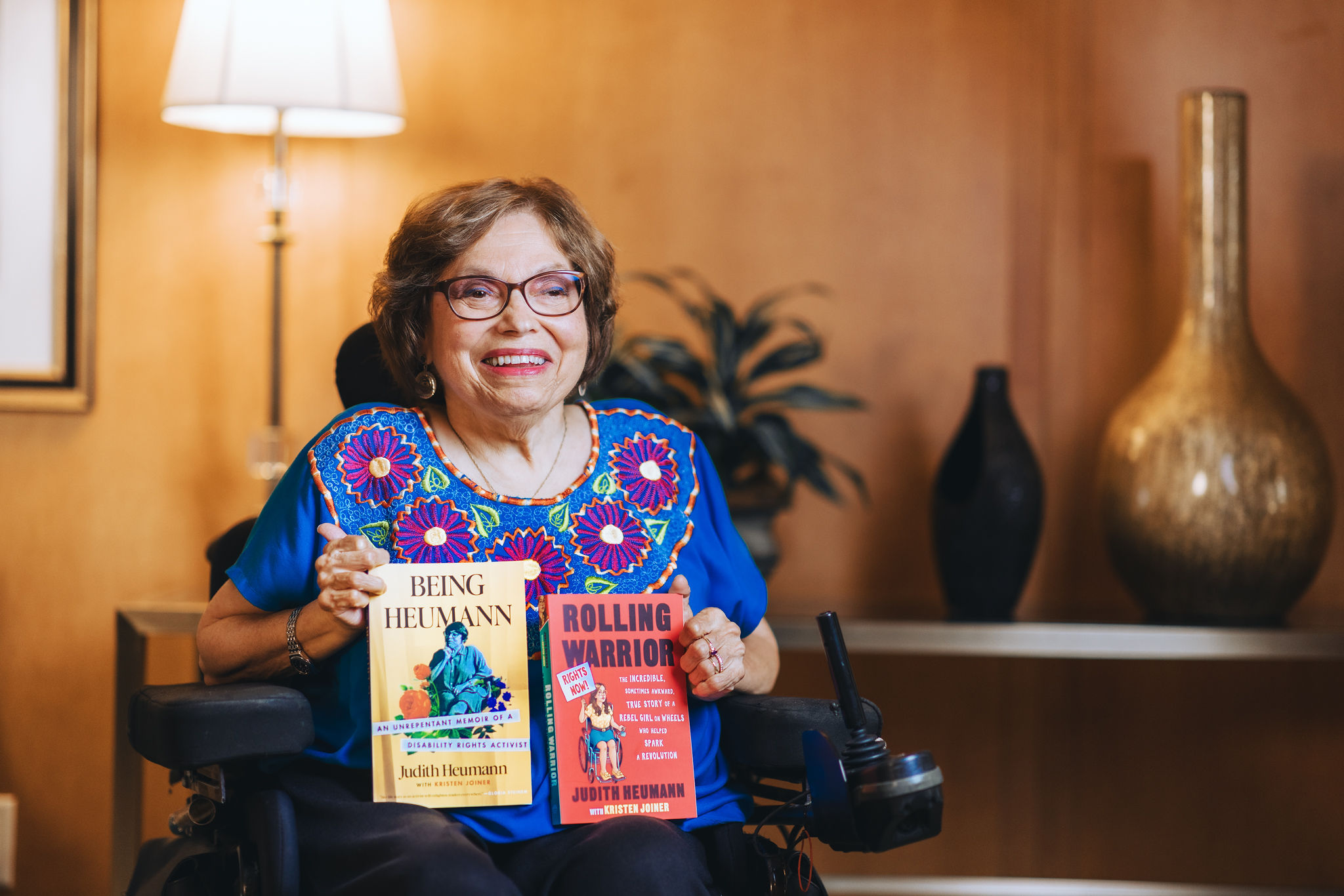Student housing at People’s Park to be named after Judith Heumann, disability rights leader
The project, slated to open in fall 2027, will bear the name of the woman who helped advocate for, develop and implement the nation's bedrock accessibility laws.

Courtesy of Kylie Miller
August 28, 2025
The 11-story UC Berkeley student housing project under construction at People’s Park will be named Judith E. Heumann House, commemorating the disability rights leader who championed accessibility and justice around the world.
Heumann, who died in 2023, graduated with a master’s degree from Berkeley’s School of Public Health in 1975. She was a key disability rights advocate who helped lead a historic 26-day sit-in at a federal building in San Francisco, which compelled lawmakers to sign the regulations for Section 504 of the Rehabilitation Act of 1973, prohibiting discrimination against individuals with disabilities. Heumann also formed and led multiple coalitions in the Bay Area and nationally that advocated for sweeping civil rights protections, which ultimately led to the passage of the Americans with Disabilities Act.
“Some people say that what I did changed the world,” Heumann wrote in her 2020 memoir, Being Heumann. “But really, I simply refused to accept what I was told about who I could be. And I was willing to make a fuss about it.”
Rick Heumann, her brother, said he hoped people would pause and consider the significance of the name on the building and be inspired to learn more about the movement his sister helped launch.
“Judy didn’t do stuff for Judy,” he said. “Judy did stuff to make a difference in the world.”
Stricken with polio when she was two, Heumann often recounted an experience during her childhood when she was unable to visit a friend because the street and apartment complex weren’t accessible. Later, a New York education official denied her a teaching license on the grounds that she was a “fire hazard,” prompting Heumann to file a lawsuit and call attention to the unfairness and absurdity of the day’s policies. She was ultimately granted her teaching license.
Her work leading the Disability Rights Movement has been chronicled in books, interviews and the acclaimed 2020 film Crip Camp, which showcases how a summer camp for teens with disabilities helped launch a movement for equity and justice.

HolLynn D’Lil
That movement led to a more inclusive world for everyone. As she told Trevor Noah on The Daily Show, the most frequent users of elevators at subway stations are often families with strollers, not just people with wheelchairs.
“People take things for granted,” Rick Heumann said. “The things they did have made your life that much easier to be able to live.”
Called “Heumann House” for short, the development will offer housing for more than 1,100 undergraduates, primarily those in their third or fourth years at Berkeley. Many of the rooms are being built to accommodate people with disabilities, and every room has the option of being made completely accessible. It’s a befitting feature for a complex that will bear the name of the “Mother of the Disability Rights Movement,” Rick Heumann said.
“That’s one of the reasons why we’re so supportive,” he said. “Having something that’s fully accessible.”

LMS Architects/Hood Design Studio
The campus in February solicited proposals for the name, which were reviewed by a subcommittee in the spring. Four separate people suggested it be named after Heumann. The subcommittee and chancellor agreed, and after obtaining permission from her family in July, the final decision was made this week.
“I think this honoring signals recognition of her brilliance, yes, but also how astute and effective she was in making concrete differences in the lives of real people,” said Ella Callow, Berkeley’s assistant vice chancellor for disability rights. “This is, essentially, Berkeley exceptionalism. It is us producing scholars who truly create sea changes, for the better, for everyone.”
The naming announcement comes as construction crews earlier this month added the steel beams that mark the highest point on the project. Now that it has been “topped out,” work will shift to the exterior facade as well as mechanical and electrical installation, said Kyle Gibson, director of strategic communications for the Office of the Vice Chancellor Administration. It’s expected to open in time for the 2027 fall semester.
“Today, we’re excited to share the news about Heumann House,” Gibson said, adding that additional details about the permanent supportive housing at the site and the surrounding park space are expected soon. “We look forward to sharing additional updates in the months ahead.”

Brandon Sánchez-Mejia/UC Berkeley
Heumann House will be just one mile from the Ed Roberts Campus, a nonprofit named for Heumann’s close colleague and a fellow Berkeley alum and disability rights leader.
When Rick Heumann talks about his sister’s remarkable life, he tells people to think about their “dash,” referring to the period between the year they were born and when they die. In his sister’s case, she lived from 1947-2023.
“Her dash resonated throughout the world,” he said.
Rick Heumann said he’s still inspired by stories about her impact and reach.
After her death, he attended a White House event that honored her work on behalf of people with disabilities. After the event — and a few selfies with then-President Joe Biden — he boarded his flight home. He struck up a conversation with the man seated next to him and mentioned that he was in D.C. for a ceremony honoring his sister.
When he mentioned her name, it sounded strikingly familiar to the man. Then he realized why: He was in the crowd when Judith Heumann delivered a moving commencement address at New York University the year prior. He vowed to rewatch it.
Those stories are ubiquitous, Rick Heumann said. But they’re not surprising — not much surprises him about his sister anymore.
“Her reach is very far and wide,” he said, “and it’s because she cared about a lot of people and she made a difference in the world.”